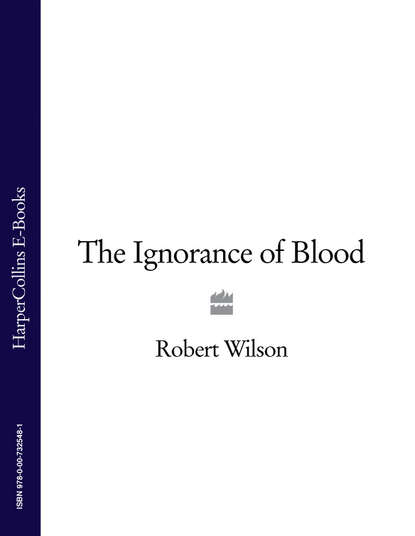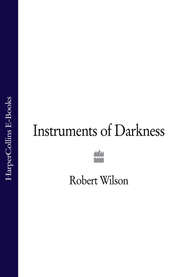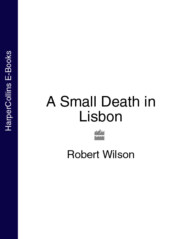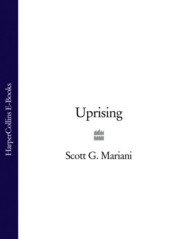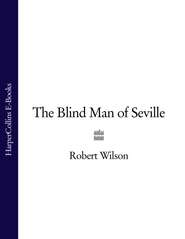По всем вопросам обращайтесь на: info@litportal.ru
(©) 2003-2024.
✖
The Ignorance of Blood
Автор
Год написания книги
2018
Настройки чтения
Размер шрифта
Высота строк
Поля
She took his hand from her stomach, kissed the fingers and pressed it between her breasts. She'd heard those words before from men, but this was the first time she'd got close to believing them.
8 (#u64072c27-c7e8-509c-bbe6-201e346fc1eb)
Consuelo's house, Santa Clara, Seville – Saturday, 16th September 2006, 07.45 hrs
Morning began with football. Falcón in goal. He had a spring in his legs so that he had to remind himself not to save everything. He let Darío send him the wrong way a few times and watched on his knees as the boy ran around the garden with his Sevilla FC shirt over his head, flying. Consuelo looked out from the sitting room in her dressing gown. She was in a strange mood, as if last night's admissions had made her cautious. She knew she loved Javier, especially when she saw his mock dismay as another of Darío's penalties rifled past him and sizzled down the back of the nylon net. There was something boyish about her cop and it made her ache as much as seeing her own son lying on his back, arms open to receive the embraces of his imaginary fellow players. She knocked on the window as if checking the scene for reality and they came in for breakfast.
Falcón sat in the front of the cab on the way back to his house and chatted cheerfully with the driver about Sevilla FC's chances in the UEFA cup. He knew it all from Darío. He picked up his car. The morning traffic on the other side of the Plaza de Cuba, screwed up by the ongoing metro construction, today posed no problems for him. He felt completely mended. Obsession had been cleared from his mind. A crescendo of the fullness of life expanded his chest. His paranoia seemed absurd. Decisions were easy. He knew now that he was going to have to talk to Pablo of the CNI about Yacoub's situation. That was something he wasn't going to attempt to manage on his own. It had come to him with clarity and accompanied by the words of Mark Flowers, the CIA agent, who doubled as a ‘Communications Officer’, attached to the US Consulate in Seville: ‘Don't try to understand the whole picture … there's nobody in the world who does.’ Just realizing the thinness of the slice of the world he saw was enough to persuade him that he needed another point of view.
Nobody from the Homicide squad was in yet. He closed the door to his office and picked up the phone with the scrambled line, which would connect him directly to Pablo in the CNI's offices in Madrid. It was a Saturday and early but Pablo was the new section head since Juan had left and Falcón knew he'd be there. It took half an hour to talk Pablo through what had happened in the apartment in La Latina yesterday afternoon and another fifteen minutes for Pablo to ask all his questions, the last of which was:
‘Where did he say he was going and when?’
‘Rabat. This morning. The GICM high command were going to give him their decision.’
Long silence.
‘Are you still there, Pablo?’
‘I'm still here,’ he said. ‘I'm wondering if there's anything that needs to be done immediately.’
‘What do you mean?’
‘Yacoub is not in Rabat.’
‘He's flying there from Madrid this morning.’
‘That's the interesting thing,’ said Pablo. ‘He flew into Heathrow last night. It might not mean anything. It might just be an omission on his part, but we still haven't found a flight into Casablanca with his name on the manifest.’
Falcón felt that metallic coldness in his stomach again.
‘This is the problem I had yesterday,’ he said. ‘I think I'm losing him.’
‘Trust is a strange thing in this game,’ said Pablo. ‘It's more fluid than in the real world. You can't expect someone who's constantly dissimulating to be as reliable as yourself. Look what happens to married people when they have affairs. The first few lies are OK. Then, as time goes on and the subterfuge builds, the lying becomes an all-consuming activity. Yacoub is now having to pretend to be someone else almost twenty-four hours a day. The GICM have racked up the pressure by invading his domestic situation, which means that Yacoub now has one less rock to stand on to remind himself of who he really is.’
‘And I'm his last remaining rock.’
‘Without you, he's in danger of losing that vital sense of self,’ said Pablo. ‘Part of your job is to shore him up. Let him know that you are dependable, that you can be trusted in every situation.’
‘He told me not to talk to you,’ said Falcón. ‘He was obsessed with losing control to others. He's trying to control me and yet he's putting himself beyond my control. I'm not sure where I stand any more. All I know is that it will be below his son, Abdullah.’
‘You have to rebuild that trust. He must feel that it's you and him against the GICM. You have to anchor him,’ said Pablo. ‘I'm going to get more information on what he's doing.’
‘Whatever you do now will expose me. He'll know that I've talked to you.’
‘This fluidity of trust is a two-way thing,’ said Pablo. ‘He hasn't gone straight to Rabat as he told you. You've come to me for some advice on how to proceed. Nobody's been hurt. Just leave it with me for a while. Don't go anywhere else for advice, especially not to that “friend” of yours, Mark Flowers.’
He hung up. Pablo didn't like Falcón's relationship with Mark Flowers, which had started four years ago when Falcón had earned the CIA agent's respect during one of his investigations. Since that time they'd exchanged information, Falcón letting him know what was happening in his police work and Flowers helping out with specialist knowledge and FBI contacts. Cristina Ferrera knocked and came into Falcón's office as he put the phone down.
‘What's happening?’ he asked.
‘We've gone through all the disks in the Russian's briefcase and we've singled out sixty-four individuals, fifty-five men and nine women. All of them have been caught on camera with their pants down, using drugs, receiving money and/or “presents”.’
‘And how are you getting on with identifying these people?’
‘Vicente Cortés from GRECO and Martín Díaz from CICO have managed to identify all of the mafia guys and all but three of the so-called “victims” in the footage.’
‘What are we talking about?’
‘The usual local council people: mayors, town planners, building inspectors, health and safety, utilities, some local businessmen and estate agents, Guardia Civil. Cortés and Díaz weren't surprised by any of it … not even the child sex footage or the women with big black guys.’
‘You look around at all these people you're supposed to be protecting,’ said Falcón, eyes drifting to the window, ‘and you find they're in it up to their necks.’
‘I've isolated a still from one bit of footage that I want you to look at. You'll have to come next door to see it because Inspector Ramírez is making sure everything is confined to one computer. We don't even want the stills on a LAN in case they find their way out to our “friends” in the press.’
Falcón followed her out. Ferrera's fingers rapped the keys as she sat at the desk. An image came up on the screen of two people: a man kneeling behind a woman whose bottom was raised, face and shoulders on the bed. The girl was looking directly into the camera. Ferrera tapped the screen.
‘I'm absolutely certain,’ she said, ‘that this woman is Marisa Moreno's sister. I even went back to the police station and found the picture which had been supplied by Marisa to her “missing” file. She's only seventeen in the old shot but… what do you think?’
Ferrera's photo was of a girl with her hair unplaited, Afro style. The eyes were innocent and wide, her mouth closed tight with bee-stung lips. The woman on the screen was in her mid-twenties, which would have been Margarita Moreno's age now. Her hair was plaited, which wasn't the only difference. The eyes weren't innocent any more but glazed, unfocused, out of it.
Falcón held the photo Marisa had given him yesterday up to the screen. Margarita's hair was plaited in the shot.
‘You're right, Cristina. Good work,’ he said. ‘Now we're getting to it, Marisa, aren't we?’
‘Getting to what?’ asked Ferrera.
‘Another version of Marisa's story,’ said Falcón. ‘The reason why she was having an affair with Esteban Calderón, why that affair included more than just sexual duties, and, perhaps, why Inés was murdered in her own home.’
‘Marisa is in with the Russians?’
‘I've been to see her twice and each time I've had a threatening phone call within hours of our meetings,’ said Falcón. ‘Has the man in this shot been identified?’
‘Not yet.’
‘Tell Cortés and Díaz that, out of the three, this is the first shot that they have to work on. This guy will tell us where Margarita is being held,’ said Falcón. ‘Now let's go back to Marisa.’
‘Both of us?’
‘She doesn't like men,’ said Falcón. ‘I want you involved with her.’
On the way to Calle Hiniesta Cristina Ferrera called Inspector José Luis Ramírez and Vicente Cortés. The shot was accessible on Ramírez's computer in padlocked files to which only he and Ferrera had the password.
Marisa was not at home. They walked to her atelier on Calle Bustos Tavera. Marisa answered the door in a scarlet silk dressing gown open to reveal bikini briefs. She held a hammer and a wood chisel in one hand, a chewed cigar stub in the other.
‘You again,’ she said, making eye contact with Falcón, before dropping her gaze to Ferrera. ‘Who is this?’
‘I can perfectly understand why you don't like men now, Marisa,’ said Falcón. ‘So I've brought another member of my squad to talk to you. This is Detective Cristina Ferrera.’





